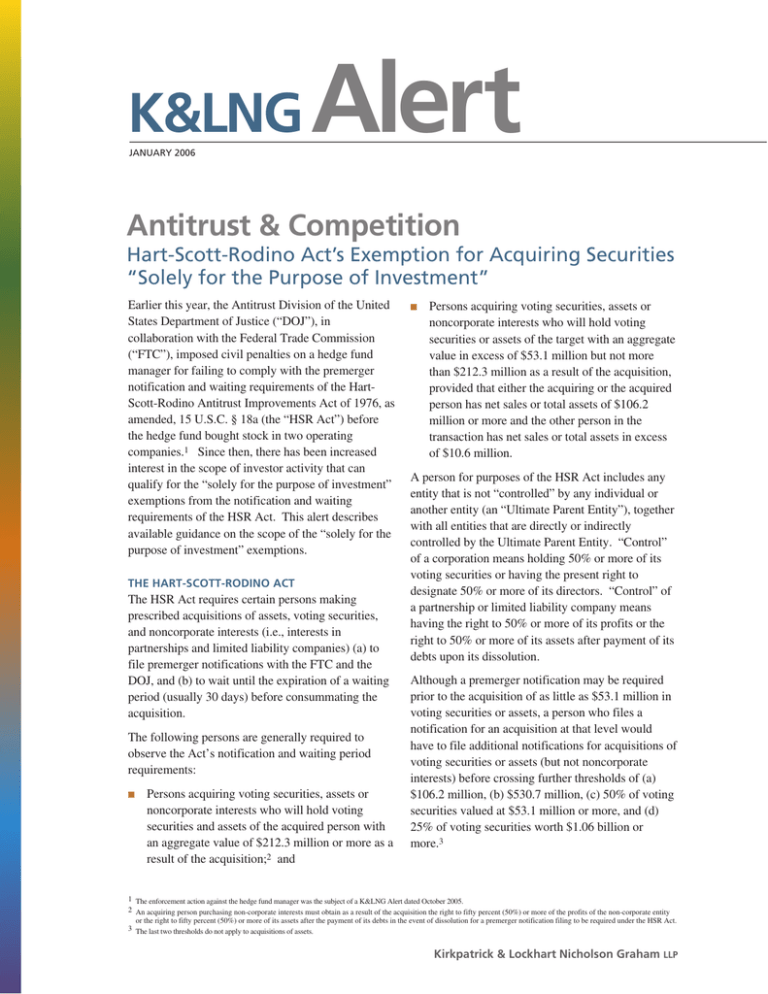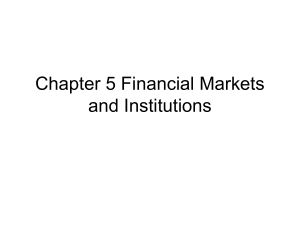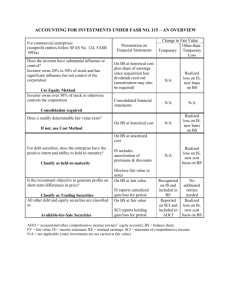
K&LNG
JANUARY 2006
Alert
Antitrust & Competition
Hart-Scott-Rodino Act’s Exemption for Acquiring Securities
“Solely for the Purpose of Investment”
Earlier this year, the Antitrust Division of the United
States Department of Justice (“DOJ”), in
collaboration with the Federal Trade Commission
(“FTC”), imposed civil penalties on a hedge fund
manager for failing to comply with the premerger
notification and waiting requirements of the HartScott-Rodino Antitrust Improvements Act of 1976, as
amended, 15 U.S.C. § 18a (the “HSR Act”) before
the hedge fund bought stock in two operating
companies.1 Since then, there has been increased
interest in the scope of investor activity that can
qualify for the “solely for the purpose of investment”
exemptions from the notification and waiting
requirements of the HSR Act. This alert describes
available guidance on the scope of the “solely for the
purpose of investment” exemptions.
THE HART-SCOTT-RODINO ACT
The HSR Act requires certain persons making
prescribed acquisitions of assets, voting securities,
and noncorporate interests (i.e., interests in
partnerships and limited liability companies) (a) to
file premerger notifications with the FTC and the
DOJ, and (b) to wait until the expiration of a waiting
period (usually 30 days) before consummating the
acquisition.
The following persons are generally required to
observe the Act’s notification and waiting period
requirements:
■
Persons acquiring voting securities, assets or
noncorporate interests who will hold voting
securities and assets of the acquired person with
an aggregate value of $212.3 million or more as a
result of the acquisition;2 and
■
Persons acquiring voting securities, assets or
noncorporate interests who will hold voting
securities or assets of the target with an aggregate
value in excess of $53.1 million but not more
than $212.3 million as a result of the acquisition,
provided that either the acquiring or the acquired
person has net sales or total assets of $106.2
million or more and the other person in the
transaction has net sales or total assets in excess
of $10.6 million.
A person for purposes of the HSR Act includes any
entity that is not “controlled” by any individual or
another entity (an “Ultimate Parent Entity”), together
with all entities that are directly or indirectly
controlled by the Ultimate Parent Entity. “Control”
of a corporation means holding 50% or more of its
voting securities or having the present right to
designate 50% or more of its directors. “Control” of
a partnership or limited liability company means
having the right to 50% or more of its profits or the
right to 50% or more of its assets after payment of its
debts upon its dissolution.
Although a premerger notification may be required
prior to the acquisition of as little as $53.1 million in
voting securities or assets, a person who files a
notification for an acquisition at that level would
have to file additional notifications for acquisitions of
voting securities or assets (but not noncorporate
interests) before crossing further thresholds of (a)
$106.2 million, (b) $530.7 million, (c) 50% of voting
securities valued at $53.1 million or more, and (d)
25% of voting securities worth $1.06 billion or
more.3
1 The enforcement action against the hedge fund manager was the subject of a K&LNG Alert dated October 2005.
2 An acquiring person purchasing non-corporate interests must obtain as a result of the acquisition the right to fifty percent (50%) or more of the profits of the non-corporate entity
or the right to fifty percent (50%) or more of its assets after the payment of its debts in the event of dissolution for a premerger notification filing to be required under the HSR Act.
3 The last two thresholds do not apply to acquisitions of assets.
Kirkpatrick & Lockhart Nicholson Graham LLP
ACQUIRING VOTING SECURITIES “SOLELY
FOR THE PURPOSE OF INVESTMENT”
The rules promulgated under the HSR Act, 16 C.F.R.
§§ 801-803 (the “Rules”) include two exemptions
that obviate the need for HSR filings for acquisitions
that would otherwise require filings, provided that the
acquisitions are “solely for the purpose of
investment.” Section 802.9 of the Rules exempts
from the premerger notification requirements of the
HSR Act any acquiring person who acquires voting
securities of any issuer if:
(a) the acquisition is “solely for the purpose of
investment,” and
(b) as a result of the acquisition, that person will
hold 10% or less of the outstanding voting
securities of the issuer, regardless of the value
of those securities.
Section 802.64 of the HSR Rules provides an
additional “solely for the purpose of investment”
exemption applicable only to institutional investors,
which effectively increases the exemption limitation
from the 10% limitation set forth in Section 802.9 to
15%. This exemption is applicable only if:
Certain Actions Are Generally Inconsistent
With a “Solely for the Purpose of Investment”
Intent
The Premerger Notification Office of the FTC (the
“PNO”), which is responsible for interpreting the
HSR Act and Rules, has interpreted the “solely for
the purpose of investment” language very narrowly.
The PNO has declared that the exemptions apply
only to passive investors that do not have the
“intention of participating in the formulation,
determination, or direction of the basic business
decisions of the issuer.” Exempted investors may
vote their stock, but cannot otherwise influence the
issuer’s basic business decisions or participate in its
management.
The Statement of Basis and Purpose for the HSR
Rules identifies several types of conduct that may be
viewed as evidence of intent inconsistent with a
passive investment purpose and accordingly
disqualify an acquiring person from relying upon the
“solely for the purpose of investment” exemptions as
grounds for not making a premerger notification
filing. These types of conduct include:
■
Nominating a candidate for the board of
directors;
■
Proposing corporate action requiring shareholder
approval;
■
Soliciting proxies;
■
Having a controlling shareholder, director,
officer, or employee simultaneously serving as an
officer or director of the issuer;
■
Being a competitor of the issuer; and
■
Doing any of the above with respect to a parent
or affiliate of the issuer.
(a) The acquiring person is an “institutional
investor”;4
(b) The acquisition is made in the ordinary course
of business of the institutional investor;
(c) The acquisition is made “solely for the
purpose of investment”;
(d) The institutional investor will not control the
issuer as a result of the acquisition;
(e) The institutional investor will hold 15% or
less of the issuer’s outstanding voting
securities as a result of the acquisition;
(f) The issuer is not a competitor of the
“institutional investor”; and
(g) The acquiring person does not include an
entity (i) that is not an institutional investor
and (ii) that holds voting securities of the
issuer whose voting securities are being
acquired.
Furthermore, in informal advice to an investor, the
PNO advised that formulating plans or proposals to
merge, liquidate or reorganize a company,
demanding the company’s shareholder list for the
purpose of communicating with the company’s
shareholders about a proposed transaction between
the company and the shareholding investor, and
retaining the services of a proxy solicitation firm
were activities inconsistent with a “solely for the
purpose of investment” exception.
4 An “institutional investor” is limited to (i) a bank within the meaning of 15 U.S.C. 80b-2(a)(2), (ii) a savings bank; (iii) a savings and loan or building and loan company or association;
(iv) a trust company; (v) an insurance company; (vi) an investment company registered with the U.S. Securities and Exchange Commission under the Investment Company Act of 1940
(15 U.S.C. 80a-1 et seq.); (vii) a finance company; (viii) a broker-dealer within the meaning of 15 U.S.C. 78c(a)(4) or (a)(5); (ix) a Small Business Investment Company or Minority
Enterprise Small Business Investment Company regulated by the U.S. Small Business Administration pursuant to 15 U.S.C. 662; (x) a stock bonus, pension, or profit-sharing trust qualified under section 401 of the Internal Revenue Code; (xi) a bank holding company within the meaning of 12 U.S.C. 1841; (xii) an entity that is controlled directly or indirectly by an institutional investor and whose activities are in the ordinary course of business of the institutional investor; (xiii) an entity that supplies incidental services to entities that it controls directly or
indirectly but that performs no operating functions, and that is otherwise engaged only in holding controlling interests in institutional investors; and (xiv) a nonprofits entity within the
meaning of Sections 501(c)(1) through (4), (6) through (15), (17) through (20), or (d) of the Internal Revenue Code.
2
Kirkpatrick & Lockhart Nicholson Graham
LLP
|
JANUARY 2006
Investors who seek to be members of the board of
directors of an issuer, of a subsidiary of an issuer, or
of any other affiliated entity are presumed not to have
passive investment intent, and therefore to be
ineligible for the exemption. In United States v.
Gates, for example, the DOJ claimed that Bill Gates,
through a personal investment company, acquired
more than $50 million of the voting securities of an
issuer in 2002 without complying with the HSR
Act’s reporting requirements. The complaint
asserted that Gates did not qualify for the “solely for
the purpose of investment” exemption because he
intended to participate in the basic business decisions
of the issuer through, among other things, his
longstanding membership on its board of directors.
The parties eventually reached a settlement, and
Gates agreed to pay $800,000 in civil fines.5
In United States v. Pennzoil Company, the
government took the position that an acquisition of
voting securities in a competitor while the acquiring
person’s board members are “anticipating”
membership on the competitor’s board and
consequent future participation in the formulation of
the competitor’s basic business decisions is not
eligible for the “solely for the purpose of investment”
exemption. The defendant paid the government $2.5
million in civil penalties pursuant to a settlement
agreement.
Investment Intent Should Be Measured
at the Time of Acquisition
An acquisition of voting securities that is exempt
from the HSR Act because it is made “solely for the
purpose of investment” does not retroactively
become reportable if the investor subsequently
decides to play a more active role in the issuer’s
affairs. However, if this change of intent becomes
evident too soon after the initial purchase of voting
securities, it may cause the antitrust authorities to
doubt that the acquiring person truly intended to be a
passive investor at the time of the acquisition. The
FTC and DOJ have filed and successfully settled a
number of civil penalty actions in which they
contested the credibility of an investor’s alleged
change of intent from a passive to an active
investment shortly after the closing of the acquisition.
Moreover, any investor that changes its strategy and
intends to become more active in the management
and business affairs of an issuer must reexamine its
entitlement to the exemption prior to acquiring any
additional voting securities of the issuer, because it
may be required to make a premerger notification
filing in connection with such an acquisition. The
obligation to file prior to any acquisition is based
upon the total value of the voting securities that will
be held following the acquisition, including the
current value of voting securities that were originally
acquired pursuant to the “solely for the purpose of
investment” exemption. The acquisition of a single
additional share therefore may require a premerger
notification filing, and an investor who now intends
to take a more active role in the management of an
issuer no longer will be able to rely upon the “solely
for investment” exemption.
On the other hand, an investor also must be cautious
when it purchases voting securities of an issuer with
a clear intent to gain control of the issuer, but later
changes its mind, and thereafter makes additional
purchases of the same issuer’s voting securities
“solely for the purpose of investment.” Although the
earlier intent to control the issuer does not by itself
disqualify the investor from the exemption with
respect to the new acquisition, it may be difficult to
convince the FTC and the DOJ that the new
acquisition was undertaken without any continuing
intent to influence the management of the issuer.
Intent to Purchase More Than Ten Percent
(or Fifteen Percent) of an Issuer’s Voting
Securities in a Future Acquisition, but Less
Than a Controlling Interest, Does Not
Necessarily Make the Exemption Unavailable
The “solely for the purpose of investment”
exemption applies to acquiring persons other than
institutional investors only if the investor’s holdings
will not exceed 10% of the outstanding voting
securities of the issuer as a result of the acquisition.
An institutional investor’s exemption only applies if
its holdings will not exceed 15% of the issuer’s
outstanding voting securities as a result of the
acquisition. The investor’s intent, however, becomes
irrelevant once its holdings exceed 15% in the case of
an institutional investor and 10% in the case of all
other investors, and the “solely for the purpose of
investment” exemption no longer applies.
The PNO, however, has taken the position that a
declaration of intent to exceed the maximum
investment percentage under the “solely for the
5 A maximum civil fine of $11,000 per day may be assessed for each day after a party has consummated an acquisition without making a required premerger notification filing under the
HSR Act.
3
Kirkpatrick & Lockhart Nicholson Graham LLP
|
JANUARY 2006
purpose of investment” exemption does not, by itself,
preclude application of the “solely for the purpose of
investment” exemption to a current acquisition for
investment purposes. Thus, acquisitions that do not
result in holdings exceeding 10% (or 15%) of the
voting securities of an issuer may still be completed
during the statutory waiting period following the
filing of a premerger notification under the HSR Act
for an acquisition pursuant to which the acquiring
person will exceed the exemption’s ceiling, provided
that the existing investment remains “solely for the
purpose of investment.”
However, any consideration of acquiring control of
the issuer (even if working control can be achieved
by holding substantially less than 50% of the issuer’s
voting securities) immediately disqualifies the
acquiring person from the “solely for the purpose of
investment” exemption. In United States v. Farley,
the DOJ took the position that the acquiring person
improperly purchased voting securities of an issuer
without observing the notification and waiting
requirements of the HSR Act. The DOJ asserted that
the acquiring person could not have been acting
solely for the purposes of investment because it was
considering the possibility of acquiring control of the
issuer when it began acquiring its voting securities.
The DOJ and the acquiring person eventually
reached a settlement in which the acquiring person
paid a $425,000 civil penalty.
CONCLUSION
A complex legal and factual analysis may be required
to determine whether or not a purchase of voting
securities by an investor will require a premerger
notification under the HSR Act. Investors will be
subject to significant civil penalties if they
consummate an acquisition of voting securities
without making a required premerger notification
filing under the HSR Act. An investor therefore
should consult with counsel prior to making a
significant purchase of voting securities or prior to
any change of strategy with regard to its involvement
in the management of a company in which it holds
voting securities.
Thomas A. Donovan
tdonovan@klng.com
412.355.6466
Oded Green
ogreen@klng.com
412.355.6584
If you have questions about this topic or would like more information on Kirkpatrick & Lockhart Nicholson
Graham LLP, please contact one of our lawyers listed below:
LONDON
Neil Baylis
44.20.7360.8140 nbaylis@klng.com
NEW YORK
Laura Harcombe
44.20.7360.8186 lharcombe@klng.com
Douglas F. Broder
212.536.4808 dbroder@klng.com
PITTSBURGH
James E. Scheuermann 412.355.6215 jscheuermann@klng.com
Thomas A. Donovan 412.355.6466 tdonovan@klng.com
www.klng.com
BOSTON • DALLAS • HARRISBURG • LONDON • LOS ANGELES • MIAMI • NEWARK • NEW YORK • PALO ALTO • PITTSBURGH • SAN FRANCISCO • WASHINGTON
Kirkpatrick & Lockhart Nicholson Graham (K&LNG) has approximately 1,000 lawyers and represents entrepreneurs, growth and middle market companies,
capital markets participants, and leading FORTUNE 100 and FTSE 100 global corporations nationally and internationally.
K&LNG is a combination of two limited liability partnerships, each named Kirkpatrick & Lockhart Nicholson Graham LLP, one qualified in Delaware, U.S.A. and
practicing from offices in Boston, Dallas, Harrisburg, Los Angeles, Miami, Newark, New York, Palo Alto, Pittsburgh, San Francisco and Washington and one
incorporated in England practicing from the London office.
This publication/newsletter is for informational purposes and does not contain or convey legal advice. The information herein should not be used or relied
upon in regard to any particular facts or circumstances without first consulting a lawyer.
Data Protection Act 1988—We may contact you from time to time with information on Kirkpatrick & Lockhart Nicholson Graham LLP seminars and with our
regular newsletters, which may be of interest to you. We will not provide your details to any third parties. Please e-mail cgregory@klng.com if you would
prefer not to receive this information.
© 2006 KIRKPATRICK & LOCKHART NICHOLSON GRAHAM LLP. ALL RIGHTS RESERVED.



